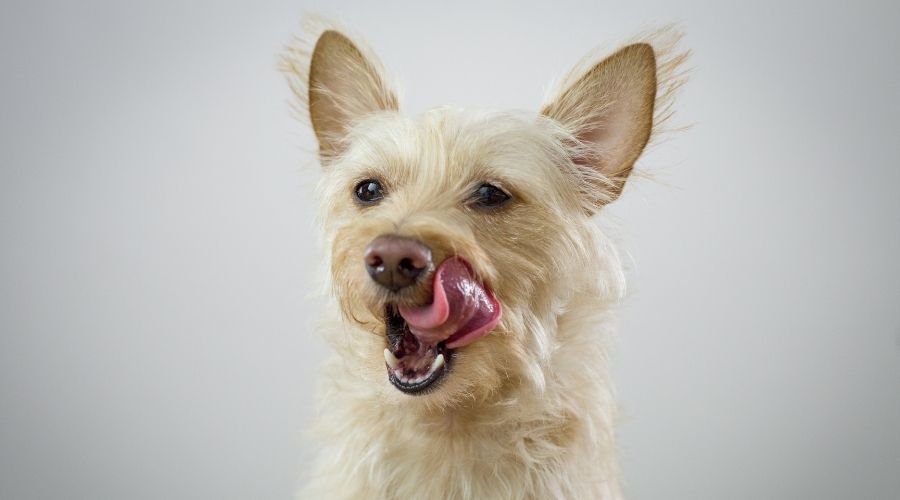That odd little quiver in your dog’s mouth after licking is called the Flehmen Response. This bizarre reaction is different for canines than other species like horses or cats, which often curl their lips instead.
Your dog has an involuntary physical response to their vomeronasal scent detecting organ when using their tongue to collect odors in the mouth. Why do dogs’ mouths quiver after licking?
A dog’s mouth will quiver after licking because of an involuntary reaction known as Flehmen Response. They are directing odor molecules into their Jacobson’s organ, also known as the vomeronasal organ, which helps them smell things. This physical response to a stimulus happens most often when they smell pheromones but can also occur for other scents.
Table of Contents
Why Do Dogs Mouths Quiver After Licking Themselves
A dogs’ mouth quivers after licking themselves because of the Flehmen Response. This is also known as flehmen position, flehmen reaction, flehmen grimace, flehming, or flehmening. It is an involuntary reaction.
The jaw of your pet can shudder after they press their tongue against the vomeronasal organ inside the roof of their mouth.
This reaction happens most often when testing something containing pheromones, but it can also occur for other scents. Essentially, it is a strong physical response to an extreme stimulus.
According to Canine Care, “Pheromones are chemical substances secreted by glands. They are found in saliva, feces, and urine. When your dog licks urine, they are essentially “reading” the pheromones from another dog that will then cause specific behavioral reactions including sexual behaviors.”
However, a dog can also quiver in excitement. This happens all over their bodies, but it can also be isolated to one specific area.
If the odor is intriguing enough to your pet’s mouth, quivering could be a response to the way they feel about it, flehmening, or both.
Why Do Male Dogs Mouths Quiver After Licking A Female Dog
Your male dogs’ mouth quivers after licking a female dog because he is excited. Interestingly, this is one example of when the quiver might not be mere flehmening. Especially if the female is in heat, that could provoke the male dog.
Additionally, it’s worth noting that even fixed males can have this reaction, though it is less common. Unaltered dogs usually have a more robust version of this reaction.
Regardless of age or the presence of testes, their instincts remain, so getting excited over a potential mate is normal behavior.
There’s nothing to be concerned about when your pet reacts in this manner. It is a standard response because the female ‘contains’ pheromones that intrigue him biologically.
Unlike humans, dogs are less discerning about mating, and they may have a flehmen response even if they typically don’t get along with that particular dog.
Even a female dog can have this response, though it’s much less likely that she’s interested in mating.
Why Do Dogs Mouths Quiver After Licking Pee
Your dogs’ mouth quivers after licking pee for two reasons. First, the urine contains pheromones that tell your dog who peed there.
It’s a lot like a signature, and your pup can read it. Flehmening is just the reaction to using the vomeronasal organ regardless of what they lick.
Secondly, pee smells terrible. Although I can’t be sure, it’s safe to assume it tastes pretty rank as well, mainly if it’s old urine that has been out a while.
According to Multi-Clean, “As urine rests on a surface and dries out, a residue is left behind that becomes a source of food for bacteria. These bacteria collectively referred to as “odor-causing bacteria” work on consuming the urine.”
Older pee smells worse because it’s growing bacteria. The mouth quiver from a foul smell or taste is your dogs’ version of making a face.
They are expressing their dislike of something gross. Worse still, because your dog has over three hundred million scent glands, they may be able to taste the pee and tell what different types of bacteria are eating it.
Why Does My Dog’s Mouth Quiver After Licking Blood
If your dog licks blood and their mouth starts quivering, they may be flehmening because they are suddenly hungry. Check for any signs of drool.
The smell they get from lapping at blood will tell them precisely what sort of creature is injured. Animal blood can trigger the hunting instincts in your pet even when they’ve never caught their own food.
Alternately, when your dog licks your blood from a cut or wound, they may still get the mouth quiver, but probably not because they want to eat you.
In that scenario, they want to help you and probably licked out of concern. Dogs are intensely loyal, but that doesn’t stop the vomeronasal organ from doing its job.
Helpful Tips To Know About Why Do Dogs Mouths Quiver After Licking
Most dogs’ mouths will quiver, or their teeth will chatter after licking anything with a pungent or exciting odor. Involuntary mouth movement is a normal canine reaction tied to their Jacobson’s organ and superior sense of smell.
Here are more tips to know about why dogs’ mouths quiver after licking.
- The Flehmen Response isn’t always a quiver. Sometimes it looks more like your pet’s teeth are chattering for a moment. Both responses mean the same thing. Your dog is experiencing smell in a way we literally lack the organic processors to understand.
- Dogs can use their quivering mouth for other reasons. Sometimes they distract themselves with this odd little quirk, or it can be an expression of distaste and a warning to another animal to stay away. More alarmingly, a quivering moth could be a sign of severe pain, especially in the mouth or teeth. It is also associated with canine neurological disorders such as Epilepsy, Degenerative Myelopathy, Inherited Polyneuropathy, or Wobbler’s Syndrome, to name a few. If you notice your dog’s mouth often quivering or when they are not licking and sniffing things, it may be time to see a vet.
- Dogs dream. When your pet has a particularly vivid dream, they may even act out parts of it by pretending to run, making noises, or even licking and showing a flehmen response. In this case, it’s not a ‘true’ response but rather a product of their imagination or memory.
- Imbalances in a dog’s potassium or sodium levels can lead to jaw quivering that is unrelated to flehmening. Similarly, a shaky mouth may indicate that your dog got into something poisonous. Always keep a good eye on what goes in your pet’s mouth and take them to the animal hospital if they show any other unusual symptoms.
Final Thoughts
It’s hard to imagine how dogs feel when they sniff and lick at things. With hundreds of times as many scent receptors and over forty times as much of their brain devoted to processing those odors, the world must be a wonderland of significant smells.
Compared to that superpower, humans are pretty much blind in the nose. The Flehmen Response or quivering you see when your dog finishes licking something is just their way of coping with the scent collection process from three hundred million sensors. You’d probably make a face too.

